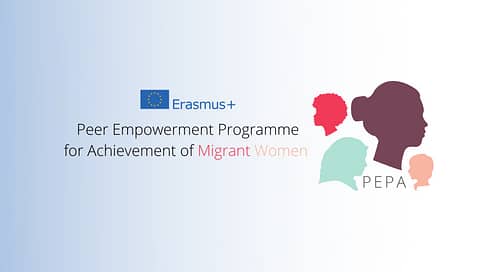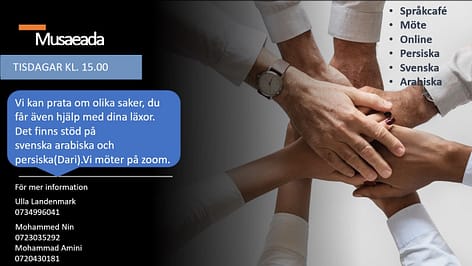A series of best practices from the SFE CEFEC WG4 – Immigration & Refugees will be added to this page in the near future.
1. Bucovina Institute, Romania
PEPA – “ Peer Empowerment Programmme for Achievement of Migrant Women

Where and Who?
This Project will be implemented during a 25 months span, starting 01.09.2020 and ending 30.09.2022. 6 International partners from different European countries are involved in this process: Fundacja Instytut Re – Integracji Spolecznej (Applicant Organisation from Poland), Go – Woman! Alliance Community Interest Company (UK), Nikanor LTD (Bulgaria), Bucovina Institute (Romania), DomSpain Consulting (Spain) and Vux Huddinge (Sweden).
Description of the practice:
PEPA is an Erasmus+ Project, designed to empower migrant women, especially those with low education/incomes or who come from vulnerable backgrounds, to offer peer to peer support in learning and social activities, including volunteering in their own communities.
To provide these opportunities, PEPA aims to create a best practice guide for practitioners, who will include findings from interviews and other research methods, to exemplify the importance of volunteering for migrant women and how to facilitate their social and economic inclusion in the partner countries. The guide will be available on multiple online channels.
Other resources that will be designed within this project include peer support guides – to be used by migrant women themselves and learning materials, available on an e – platform, for teachers, trainers, researchers and youth workers. In developing and testing these materials, PEPA plans to involve 180 migrant women and 120 practitioners, to ensure the relevance, effectiveness and accuracy of information.
Also, Bucovina Institute and DomSpain Consulting are SFE CEFEC members, a network that supports the social inclusion of vulnerable people in Europe and the world, and are going to present the results of the project within this network too.
Contact details if you need more information: https://bucovinainstitute.org/ or https://www.facebook.com/i.bucovina
_____________________________________________________________________________
2. Sweden – Inclusion of migrants in local society
Musaeada – we help each other – in Östersund and online

An initiative from new Swedes from Sudan and Afghanistan in cooperation with social involved private persons and social entrepreneurs in Sweden, to meet and to have a meeting-place – online during the corona pandemic. We are practicing Swedish and discuss actual issues and learn to know each other.
When the possibilities opened for meeting outside in 2021- we have had barbecue parties, practiced cycling for migrants’ women, made together study-visits in small-scale tourism in the region Jämtland.
Our plans for 2022 and forward, are to continue to have a meeting-place online, do activities together and to nurture our friendship.
LISA-network: rural development, inclusion, small-scale entrepreneurship, cooperation – in Jämtland and together with cooperation partners in other parts of Sweden and internationally.
Inclusion as business idea – that companies and NGO’s can share staff, employ together, depending of needs and seasons, create a social employment company to offers services, call-in new Swedes with knowledge to share information to others with migrant background, create new working possibilities through outdoor activities and tourism and invite to digital and physical meetings with lectures and study-visits for integration on countryside.

Coaching to driving license – a private initiative to support young migrants and women – in Östersund

The need of a driving-license is huge to get a job in Sweden and to get it, it is a challenge. Driving school, to study theory and be able to practice driving and the costs and the efforts. This private initiative had been ongoing since 2019, and in this moment, December 2021 – we have a cooperation between municipality, insurance company, study associations and private persons to support more migrants and young persons to reach the goal – a driving license.
Contact details: Ulla Landenmark, Sweden / www.facebook.com/construktiva
_______________________________________________________________________
3. SMILES Project – Supporting Migrants Integration Life Experience Skills
This project focused on the need of both groups to be trained not only in “conventional” basic skills, but also in life skills, a double set of skills that aims to get a better life with few means, to improve communication between and among target groups and other parts of the population, and finally to integrate them. Therefore, the project partners wanted to explore pedagogical methods and tools used in their organizations, compare and evaluate them. They needed to be sure that their methodological processes was operational, effective and efficient, bringing skills and autonomy to target groups. It is because of all the of above that the SMILES project partners aimed to formalize them in a handbook of good practices.
The Best Practices Handbook is available in 7 languages (English, French, Italian, Greek, Romanian, Spanish, Finish) and can be downloaded from HERE.

Project Facebook page: https://www.facebook.com/smileserasmus
_______________________________________________________________________
4. Inclusion of refugees in the local community by the Mobile Mental Health Unit’s services
Over the last three years in the prefecture of Fthiotida the Society of Social Psychiatry P. Sakellaropoulos has focused on the needs of the socially vulnerable groups part of which are the refugees, by implementing the following actions:
– During this period we have collaborated with organizations working with refugees such as BABEL, MdM and IRC and we participated in a series of structured training, seminars, workshops, such as psychosocial First Aid, effective collaboration between linguistic facilitators and mental health professionals gaining experience in refugee problems issues.
– Through the operation of the Mobile Mental Health Unit, responding to the needs of the local community we visited the refugee Camp of Thermopiles in order to present the services we provide and to discuss with the professionals of the existing services how we can contribute according to their needs. The most important need that emerged from our visit was the creation of a separate structure for unaccompanied minors at the region of Central Greece. In this direction we submitted α proposal to the High Commission for the operation of a hostel for 25 unaccompanied minors/ children.
In addition we visited the Regional Governor and declared our availability presenting proposals to support refugees by providing the following services:
- Organisation of playgrounds for children, adolescents and parents
- Training – supervision – support for professionals working in these areas
- Monitoring and support of refugees with psychiatric needs (crises), after the first visit to the psychiatric clinic of General Hospital
We came in contact with the organization “Solidarity” in order to present the services we provide and to discuss how we can contribute to the needs of refugees. Through this communication the organization asked us to respond to two requests for refugees living in the community:
The first request concerned the psychological support of a female refugee from Iran with a depressive disorder living in an apartment in Lamia city. We supported this woman through our services for one year in terms of psychological support, integration into community and searching work.
The second request concerned the invitation of the municipality of Livadia to evaluate the needs of a Syrian refugee adolescent who lives in a protected apartment in Livadia in order to proceed to a therapeutic plan and to provide her psychosocial support.
Furthermore, we created a Local Mental Health Team which is consisted of a wide range of local services and stakeholders such as municipals services, welfare services and other local facilities. The aim of this team is to offer information, prevention and support on crisis situations within the local community.
In addition, a proposal was submitted to participate in the Consultation Committee of the Municipality of Lamia concerning the organization of refugee needs and services.
Finally we came in touch with the organization “Solidarity” to organize sensitization activities in the local community and to implement social activities for refugee women living in camp that would enable them to overcoming barriers they may face in transitioning into a new environment.
Both actions are temporarily postponed due to Covid-19 restrictive measures.
Best practice GreeceWebsite of the Organization: www.ekpse.gr
__________________________________________________________________________
5. MEET Me Trieste Ostersund Project – Inclusion of Foreign Unaccompanied Minors
An Erasmus+ small-scale partnership project with the objective to improve and increase the competences of the organization staff, to broaden the minds and question prejudices, with the final aim to improve the capacity to support unaccompanied minors in quality services.
For more details, check these 2 materials developed by the project partners:
